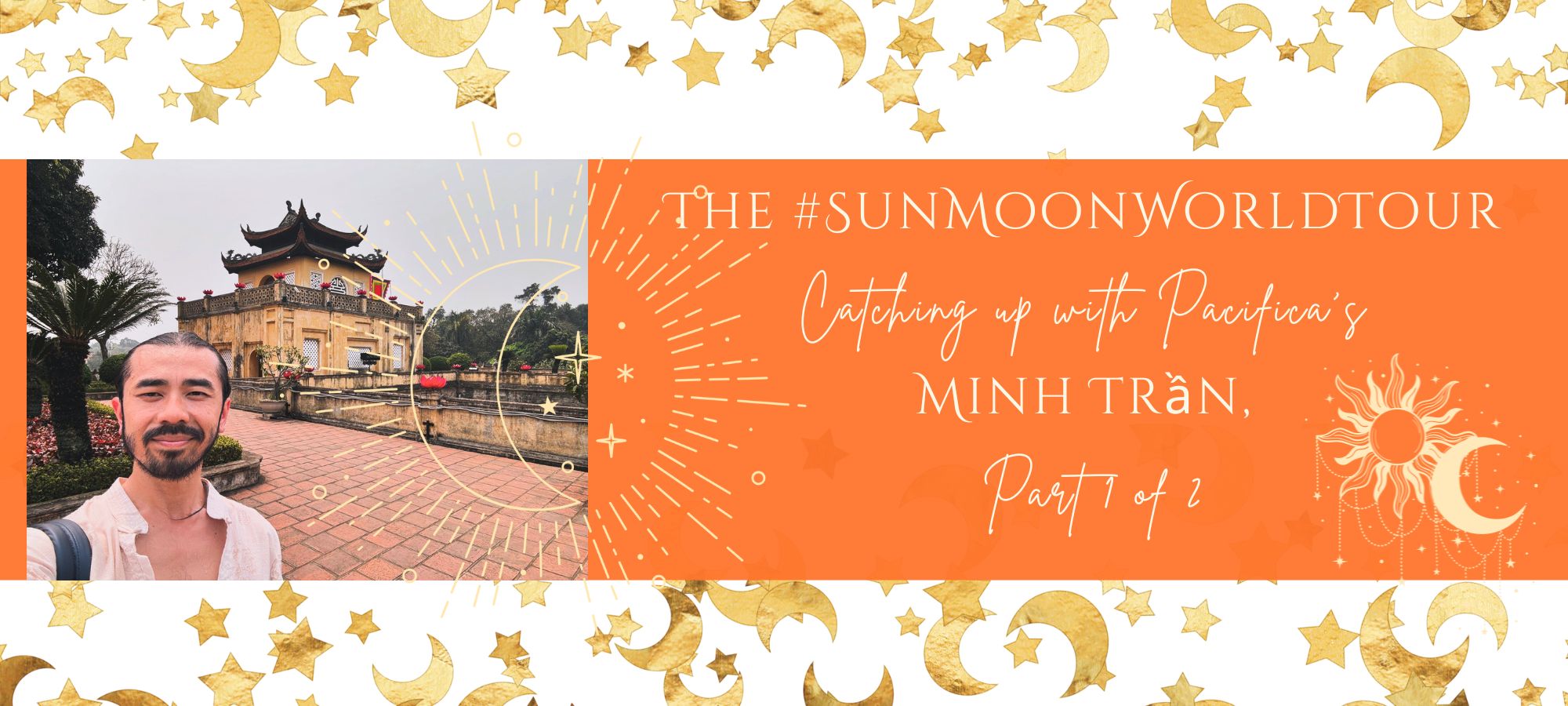Minh Trần is in the Ph.D. in Depth Psychology with Specialization in Integrative Therapy and Healing Practices at Pacifica Graduate Institute. He is currently in the final writing and editing phase of his dissertation. I’m delighted to catch up with this dynamic scholar and hear about his travels and research.
Angela Borda: Hello, Minh! It’s wonderful to be speaking with you again. The last time we spoke, in 2021, you were a full-time Pacifica student and a practicing therapist, putting together research grant proposals for your dissertation topic, which you described as being about the “indigenous Mother-Goddess worship system of Việt Nam.” Update us, please, on where you are in your dissertation process and where in the world you are and why!
Minh Trần: Hi Angela, great to see and hear from you again. For Fall quarter 2024, I am situated here in Buenos Aires, Argentina, for a few months after the whirlwind European leg of the #SunMoonWorldTour! I had presented at two back-to-back IAAP (International Association for Analytical Psychology) conferences in Siracusa, Sicily, in late-August. Right now, I am putting the finishing touches on my dissertation manuscript with my team (committee members, participatory action research co-investigators, and recently a hire-on editor/proofreader). Buenos Aires has been known for over a decade now as the “psychotherapy capital” of the world, with more psychotherapists per capita than any other major metropolitan on the globe. Psychoanalysis is a big deal here, and I’d like to connect with Jungians in this city while I’m here, as well as learn some Spanish!
Earlier this year, I was traveling around Southeast Asia. A big part of my time in Southeast Asia this year was in northern Việt Nam where, for 3 months, I was conducting ethnographic fieldwork for my dissertation topic. The research study asks: “What are the psychological mechanisms of spiritual and cultural healing in Đạo Mẫu Tứ Phủ?” Prior to that, in Q1 of 2024, I was going back-and-forth between Denver, Houston, northern and southern California conducting State-side fieldwork with the Đạo Mẫu Mother-Goddesses communities in the diaspora as well.
Angela: What are some of the experiences you’ve had during the #SunMoonWorldTour that stick with you and what has been most unexpected about your travels?
Minh: Well, firstly, the #SunMoonWorldTour is meant to be a place where all my travel journeys can be funneled and documented into one cyber space and easily searchable on social media, and yes, certainly a major part of that has been my fieldwork for this dissertation project. There’s been so many twists and turns carrying out fieldwork for this dissertation project; the Trickster gods have been after me all year! This included an unexpected financial crisis at the beginning of this year while I was conducting fieldwork in the U.S., which made it necessary to sleep at the Mother-Goddesses temples of my participatory action research co-investigators for extended periods. Of course, this also opened opportunities to deepen connections with my research communities and more opportunities to conduct semi-structured interviews with research participants, attend more temple ceremonies, and have rich autoethnographic data for my study. The crisis also delayed my fieldwork time in Việt Nam, which in turn eventually led me to attend two additional UNESCO-recognized “intangible cultural heritage of humanity” festivals in Việt Nam, including that of the Mother-Goddesses, as well as the celebration of Thánh Gióng. The Thánh Gióng myth is what I had incorporated into my “showprentations” (musical lectures) at the IAAP conferences in Sicily at the end of August. The presentations used the myth to circumambulate the archetype of early-blooming/late-blooming.
Angela: You’ve described yourself as a “boat person,” so I can imagine that revisiting the places where your journey began might be emotionally impactful, in your case also, an intersection of personal history with your dissertation research. What revelations have come and has your relationship with the goddess and also depth psychology changed as a result?
Minh: I was a Vietnamese boat person and took part in it at the tail end of that saga in human history, even though I was very young, this is true. My very first memory in this lifetime was conceived at the refugee camp on Pulau Bidong, an island off the coast of Kuala Terengganu, Malaysia. My opportunity to revisit the old refugee camp in Malaysia after my field time in Việt Nam felt so guided by the forces of mystery that I have been tearful every time I think about this revisit. When I was able to return to Pulau Bidong on August 6th, a second early-childhood memory came back to me while walking on one of the tropical island’s pristine beaches, where this memory had been conceived 35 years prior.
Nothing this year has gone according to my ego’s plans, really, but everything has turned out much more than I (my ego) could ever have hoped for. As Jungian depth psychology reaches into the transpersonal, or spiritual, dimensions of human experiences, I could not be more humbled by the guiding hands of mystery, whether we call that the “gods,” the “goddesses,” or the “autonomous unconscious.” As a result, I have found myself feeling more mortal and yet more connected to the vastness of mystery than ever, just as long as I stay awake and aware in my everyday response to this unfolding mystery, of course.
Angela: What has been the most unexpected experience of your travels so far?
Minh: The trip to the old refugee camp was pretty unexpected, but additionally, I was not expecting that I would make some truly meaningful connections on the road, and especially during my time in Việt Nam’s capital, Hà Nội. As much as I can “turn it on” as a performing artist, I really am your typical introverted psychotherapist at heart, and to have been forced to extrovert so much and with Vietnamese people who trigger all kinds of family complexes in me and to still have met and formed some truly meaningful connections with other Vietnamese people, that’s nothing short of a personal healing and transformative experience to me as a nascent autoethnographer who has used his self as an instrument of research on this dissertation journey. Oh, and my semi-impromptu trip to Athens, Greece, where I got to visit the Temple of Dionysius at the Acropolis right after my theatrical “musical lecture” presentations in Sicily was super synchronistic too!
Part II of the interview with Minh Trần can be found here. To learn more about Integrative Therapy and Healing Practices at Pacifica Graduate Institute, click here.

Minh Trần, LMFT, is a PhD candidate at Pacifica Graduate Institute in the Depth Psychology with Specialization in Integrative Therapy and Healing Practices program. Minh also received his MA in Counseling Psychology degree from Pacifica. Between his master and doctoral programs at Pacifica, Minh received scholarships to attend and complete the postgraduate Psychedelic-Assisted Therapies and Research program at the California Institute of Integral Studies while completing marriage and family therapy licensure requirements under the LA County MFT Consortium Stipend fellowship. Since becoming a doctoral candidate in Spring of 2022, Minh has been traveling the world as a digital nomad presenting his “musical lectures” at psychological conferences and conducting ethnographic fieldwork for his dissertation.

Angela Borda is a writer for Pacifica Graduate Institute, as well as the editor of the Santa Barbara Literary Journal. Her work has been published in Food & Home, Peregrine, Hurricanes & Swan Songs, Delirium Corridor, Still Arts Quarterly, Danse Macabre, and is forthcoming in The Tertiary Lodger and Running Wild Anthology of Stories, Vol. 5.


